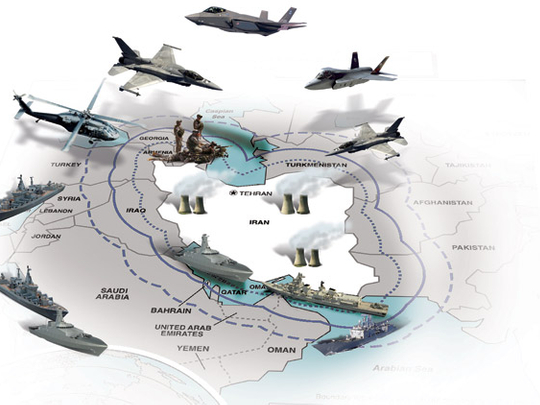
It doesn't matter that the Islamic Republic of Iran has an absolute right to pursue nuclear energy for civilian use and to enrich low-grade uranium under the Nuclear Non-Proliferation Treaty (NPT) to which it is a signatory.
What matters is that the international community is suspicious of Tehran's stated intentions and will not accept a nuclear-armed Iran.
The US will not countenance an enemy nation with nuclear weapons within its oil-and-gas rich sphere of influence. Israel believes Iranian nukes would threaten its very existence. Most of Iran's neighbours are fearful of Iranian military dominance, which the acquisition of weapons of mass destruction would provide.
Most major powers, including Russia and China to varying degrees, are keen to ensure that Tehran will never manufacture a nuclear bomb. The burning question is what should be done to prevent this from happening?
Carrot and stick
The first option is dialogue using a carrot-and-stick approach. Thus far, this has failed. The face-to-face unconditional talks between the US and Iran that were promised by President Barack Obama during the early days of his presidency have not materialised. Moreover, Obama considered a recent deal between Iran, Brazil and Turkey involving a uranium swap to be unacceptable.
The second option consists of anti-Iranian UN sanctions. Three rounds of sanctions against Iran have been approved by the UN Security Council, which have failed to bite; mainly because China is opposed to any harsh punishment of an ally with which it enjoys strong economic links.
Former US secretary of state Colin Powell told ABC's This Week that sanctions won't work.
"The Iranians have been around for thousands of years trading and selling and getting around, various constraints and what not," Powell said.
In any event, sanctions are unlikely to force Tehran to relinquish its right to nuclear energy and technological advancement which Iranians feel are matters of national pride. Certainly ten years of anti-Iraqi UN sanctions inflicted great hardship upon the Iraqi people but did not bring Baghdad to its knees.
The military option has been touted and discussed in Western corridors of power for almost a decade. This would involve either the US or Israel (or both) striking Iran's nuclear facilities. This option has been off the table for some years and, in fact, George W. Bush resisted pressure for his neoconservative cabal to give a green light to the former Israeli prime minister Ehud Olmert, thought to have been champing at the bit.
However, according to the Debkafile — an Israeli political website believed to be linked to the Mossad — Iran is currently on "war alert over US and Israeli concentrations in Azerbaijan".
The article maintains that "Israel has secretly transferred a large number of bomber jets to bases in Azerbaijan, via Georgia and that American special forces are also concentrated in Azerbaijan in preparation for a strike. It further cites "the arrival of the USS Harry S. Truman Strike Group" in the Gulf and the Arabian Sea "and its war games with France and Israel, which included live fire-bombing practices."
Debkafile also highlights this comment made by Dr Uzi Arad, head of Israel's National Security Council and a close adviser to Prime Minister Benjamin Netanyahu: "The latest round of UN Security Council sanctions on Iran is inadequate for thwarting its nuclear progress. A preemptive military strike might eventually be necessary."
But before those of us who live in the region send off for gas masks and tin hats, it may be that the alleged military build-up and Israel's increasingly belligerent rhetoric is a bluff designed to send Tehran a message.
A newly-published report by the Oxford Research Group, which is a respected British think tank, suggests the military option is no option.
"An Israeli attack on Iran would be the start of a protracted conflict that would be unlikely to prevent the eventual acquisition of nuclear weapons by Iran and might even encourage it," it reads. "This would be in addition to the extensive instability and unpredictable security consequences for the region…"
Two alternatives
The report proposes two alternative paths open to Western states. The first centres upon "redoubling efforts to get a diplomatic settlement", facilitated by a serious Israeli-Palestinian peace process, the beginnings of a nuclear-free Middle East and improved relations between Iran and the Gulf states.
The second hangs upon a general acceptance that Iran "may eventually acquire nuclear capability" which the report admits would not be easy "given Israel's position and the possibility that an Iranian nuclear weapons capability could encourage regional proliferation."
Lastly, the Oxford Research Group believes that "war is not an option in responding to the difficult issue of Iran's nuclear ambitions." That's a view which I wholeheartedly share. An attack on Iran will inflame Syria and Lebanon, which would probably be drawn into the conflict.
It would also lead to high numbers of civilian casualties, increase attacks on Western interests, interrupt the flow of oil and harm the struggling global economy. And one consequence is sure. If Iran isn't pursuing nuclear arms now, at the first opportunity, it will be.
Will the US and Israeli hawks prevail or will cooler heads clip their wings? We've yet to see.
Linda S. Heard is a specialist writer on Middle East affairs. She can be contacted at lheard@gulfnews.com









